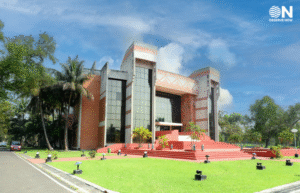ObserveNow Media hosted the 3rd Edition of the PSU Summit & Awards on September 19, 2024, in New Delhi. Themed “Transforming the Public Sector: A Vision for the Future,” the event proved to be a major success, bringing together leaders and stakeholders from India’s Public Sector Undertakings (PSUs) for an in-depth exploration of the future of government-owned enterprises.
The summit featured high-level dialogues on innovation, public enterprise management, and strategies to drive transformation in the public sector. With over 40 speakers, 10+ industry leaders, and 120+ delegates in attendance and supported by partners like Cloudera as the Platinum Partner, 3rd Eye Techno Solutions as the Digital Forensic Partner, Alliance Pro & Skillmine as Associate Partners, and Array, Will & Decathlon as Exhibitors. The event’s CSR initiative is supported by Pleasin Strides.
The summit was opened with a welcome note by Taniya Tikoo, Co-Founder & Editor-in-Chief of ObserveNow underscoring the critical importance of Public Sector Undertakings (PSUs) in driving national growth and innovation. Taniya highlighted how PSUs play a pivotal role in the economy by providing essential services, creating job opportunities, and fostering technological advancements.
In his keynote address, Lt. General Vinod G. Khandare, Principal Adviser at the Ministry of Defence, emphasized that by 2047, India must be a “Viksit and Surakshit Desh”—a developed and secure nation. He stressed the importance of collective contributions to this mission, highlighting the urgency of skill development and harnessing youth productivity. He also called for collaboration between the public and private sectors to tackle significant challenges, including individual prosperity and competition with Western countries.
Notable speaker S C Garg, Executive Director (Tech.), REC who provided invaluable insights into the transformative potential of PSUs highlighted “PSUs play a crucial role, but the private sector also needs to step up and contribute. The role of PSUs in the digital transformation of the power sector is vital, especially as India stands as the 3rd largest producer and consumer of electricity worldwide. The power sector’s contributions in the changing global scenario are significant. As we move towards 2047, there is an urgent need to shift our focus towards clean energy and sustainable practices.”
A key highlight of the event was the first panel discussion on “The Future of PSUs: Catalysts for India’s Development by 2047,” moderated by Jaspreet Singh, Clients & Markets Leader – Advisory Services, Grant Thornton Bharat LLP, which explored the crucial role PSUs play in India’s long-term development goals. Jaspreet set the tone by highlighting the vital responsibilities of PSUs in empowering the country’s growth. Prashant Kumar Mittal, DDG, NIC, Government of India said “PSUs have generated immense employment, which is crucial right now. AI, like computers, won’t reduce jobs but will create new opportunities.” Manish Grover, Executive Director (Strategic IS & IS), Indian Oil Corporation Limited highlighted “We are moving forward with Vision 2047 by consolidating infrastructure. Digitalization is optimizing operations, making us more competitive.” Dr Prashant Atrey, Executive Director (IT) and HOD, NHPC Limited underscored “PSUs were created to make India self-reliant, and even today, they continue to fulfill that role. The role of the public sector remains vital.” Doman Yadav, Executive Director, POWERGRID emphasized “Both PSUs and the private sector are vital to achieving the 2047 goals. Decentralization and quicker decision-making will accelerate progress.” S C Garg, Executive Director (Tech.), REC said “The government must lead, but the private sector can support these initiatives. PSUs are key in generating employment and fostering innovation while adapting to technology.” SK Jain, Executive Director, IGL highlighted “PSUs have significantly contributed to India’s economy and social responsibility. Fast decision-making and a focus on energy transition and digital transformation are essential for the 2047 mission.”
Another critical session, “Accelerating AI Adoption in the Public Sector: Leveraging Trusted Data & Unified Hybrid Data Platforms,” delved into how AI and digital platforms are revolutionizing the public sector. Industry experts shared their views on leveraging AI to enhance public sector capabilities. Sunny Kapoor, Director -Technology Consulting, Ernst & Young LLP moderated the session expertly. Manoj Tandon, Director – Project O&M, RailTel Corporation of India said “AI and Generative AI will transform every sector, including the public sector, by enhancing operational efficiency. The education system also needs to evolve to incorporate IoT and AI.” Vijay Devnath, Group General Manager (Infra, ITSG & CDG), CRIS highlighted “CRIS has extensive railway data managed by multiple organizations, and we’ve been using AI for predictive analysis. However, we face challenges like biases in data and the need for India-focused datasets.” Saubhagya Kumar Behera, CIO & Sr VP (ERP & IT), Indraprastha Gas Limited emphasized “Clean data is crucial for AI’s effectiveness. Selecting the best infrastructure is equally important for successful implementation.” Alok Shankar Pandey, CISO & AGM-IT, Dedicated Freight Corridor Corporation of India Ltd underscored “Data security and governance are paramount in AI implementation. As we handle critical infrastructure, ensuring that AI systems are secure, scalable, and compliant with regulations is essential for safeguarding operations and citizen data.” Abhijit Bora, General Manager (Strategic IS), Indian Oil Corporation Limited “Clear guidelines and transparency in AI use are vital. Internal audits help ensure compliance, and disclaimers should highlight AI’s specific use cases.” Piyush Agarwal, Solutions Engineering Director, India, Cloudera said “Unified platforms are needed to process data efficiently, and NLP requires heavy computing. Governance and data security are critical, especially when dealing with citizen data.”
Cybersecurity was also a central theme, with the panel “PSUs and the Challenge of Cybersecurity in the Era of AI and Hybrid Technologies” focusing on how PSUs can navigate the increasing complexity of cybersecurity risks in a digital-first world. Kapil Jaiswal, Director Research (InfoSec) & CISO, Government of India Official highlighted “AI has the potential to fast-track the stages of any cyberattack by mapping threats and utilizing the same tools attackers use. This gives defenders a fighting chance against evolving threats.” Ritu Singh, General Manager- IT, NCRTC stated “PSUs are particularly vulnerable to threats as they manage critical infrastructure. Any damage to them directly impacts national security, highlighting the need for a robust governance model.” Subhash Chand, CISO, ICAR-Indian Agricultural Statistics Research Institute noted “While discussions often overlook people, we must recognize that putting all operations on autopilot is dangerous. AI disrupts digital processes, and not integrating it into our workflows is a significant oversight, though it comes with data security challenges. AI and humans should complement each other, not replace one another.” Karan Kalra, Dy CISO & DPO, National Housing Bank said “In addition to regulatory concerns, we must address ethical issues, especially the risk of amplifying social biases. With threats evolving rapidly, AI is essential for reducing false positives and analyzing vast amounts of data responsibly.” Kuldeep Singh, Alternate CISO & Dy. GM (IT-Security), NTPC Limited highlighted “AI will assist analysts by streamlining processes and enhancing decision-making capabilities. Its application can lead to more efficient operations.” Nitin Chauhan, Solution Consultant, 3rd Eye Techno Solutions Pvt Ltd emphasized “In the long term, we will see a shift towards automation and reduced manual intervention. Private organizations are increasingly focused on securing their networks across both cloud and endpoint levels.” Anil Kumar Choudhary, Chief General Manager, EESL underscored “AI’s use by hackers, particularly in generating social engineering tactics like phishing emails, necessitates advanced protective measures. Energy efficiency is crucial across all sectors, and integrating IoT and AI can significantly contribute to energy conservation.”
In a special address, B. Shanker Jaiswal, IPS, Joint Commissioner of Police (Tech, Cyber & Licensing) Delhi Police, highlighted the rapidly evolving landscape of technology and its implications for law enforcement. He pointed out that drones are becoming increasingly miniaturized, enabling them to potentially evade surveillance, which poses significant challenges in combating cybercrime. Jaiswal emphasized that cybercriminals are exploiting advanced secrecy to enhance their operations. In addition to insightful discussions, the summit featured product showcases, networking opportunities, and an awards ceremony recognizing exceptional PSU leaders and organizations driving innovation and national growth.
N. Tripathi, Executive Director of NTPC Limited, discussed the management of projects in Public Sector Undertakings (PSUs). He identified key areas for improvement, emphasizing the need for a positive culture, strong leadership, and stakeholder engagement. Tripathi noted that 38% of project management challenges arise from a lack of management support, 44% from ineffective communication, 42% from insufficient budgets, and 34% from changes in strategy. His remarks highlighted the importance of addressing these issues to enhance project success in the public sector.
The final panel discussion for the day was held on “Navigating Challenges and Opportunities: A Digital Evolution Roadmap for PSUs” and was swiftly moderated by Abhishek Vashisth, Director (Technology) – EY Centre of Excellence. Siddhartha Ghosh, Chief General Manager, GAIL said “Data porting isn’t smooth; real change in government requires management commitment. We must address data loss and system compatibility in digital transformation.” Nagendra Pratap Singh, General Manager (Strategic Information Systems), Indian Oil Corporation Limited (IOCL) highlighted “Electric vehicles face recycling challenges, and we need to focus on net emission targets. R&D is essential across all sectors.” Anup Prasad, General Manager, SAIL underscored “Collaboration between public and private sectors is crucial to harnessing technology effectively and driving innovation.” Salman Mahmood, Deputy General Manager, Food Corporation Of India noted “Digital interventions can be innovative, and predictive AI is key to analyzing trends and making informed decisions.” Dipesh Jain, Dy General Manager-IT, Power Finance Corporation emphasized “A strong data infrastructure is vital for digital transformation, enabling seamless integration and better decision-making in PSUs.” Dr. Antarpreet Singh, Director (Academics), WILL Education said “To effectively navigate digital evolution, we must prioritize robust cybersecurity measures and ensure that all stakeholders are on board.”
In a special address, Dr. Amit Kumar Jain, Director of Delhi Metro Rail Corporation, spoke about the organization’s commitment to digital transformation aimed at enhancing customer service. He highlighted the innovative technologies being implemented to improve the overall passenger experience, from real-time tracking and mobile applications to advanced ticketing systems. Dr. Jain emphasized that these digital initiatives not only streamline operations but also foster greater connectivity and convenience for commuters. By prioritizing customer-centric solutions, Delhi Metro is setting a benchmark in public transportation and paving the way for a smarter, more efficient travel experience.
While concluding, the event honoured the PSU leaders who are transforming and taking the public sector to the next level. Saubhagya Kumar Behera, Senior Vice President, Indraprastha Gas Limited, secured the award for “Best PSU in Customer Service”; Alok Shankar Pandey, AGM- IT & CISO, DFCCI bagged the Leadership Award; Amit Kumar Jain, Director Operations, Delhi Metro Rail Corporation was awarded the “Best PSU in Digital Transformation”; Nagendra Pratap Singh, General Manager, Indian Oil Corporation Ltd got the Best “PSU in Power and Energy Sector”; Anwaya Bilas Sengupta, ALT-CISO, GRID Controller of India Limited secured the “Leadership Award.”
The 3rd Edition of the PSU Summit & Awards not only showcased the commitment of public sector leaders to innovation and transformation but also highlighted the essential collaboration needed between public and private sectors. As discussions evolved around technology, sustainability, and resilience, the event reinforced the importance of strategic partnerships and forward-thinking approaches to navigate the challenges ahead. The insights shared and the connections made during the summit will undoubtedly drive meaningful progress in India’s public sector, setting the stage for a brighter future.





























